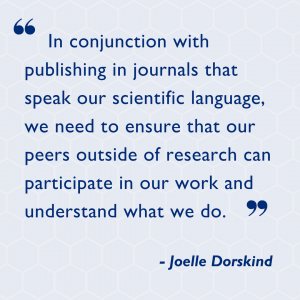Science is a complex language. It has its own vocabulary and corresponding slang, both of which take time to learn and understand. In the lab we speak this language as fluidly and comfortably as if we were raised with it as our native tongue. For some students with parents who work in science, this may very well be the case too. However, I grew up in a family of artists. The science they recall is what they learned in school or read in novels. When I check in and they ask how work is, I often hesitate. How do I explain how my experiment went or the progress of my thesis project to someone who doesn’t speak this language? I can tell they are truly interested, but the words “neuron” and “confocal microscopy” don’t give them a true mental image of a day in my life.
This is something I continue to struggle with as I speak to friends and relatives about science. How do I explain a topic I am still learning myself, while making the information concise and friendly to an audience with little scientific background? In my experience, analogies and diagrams work best. While terms such as “immunostaining” may not be commonplace, painting a picture and using specific colors to depict certain aspects of a technique or scientific concept is something nearly everyone can relate to. Similarly, while your audience may get lost in the complicated terms used to describe genomic nomenclature, putting genetic concepts in terms of familial relationships can make them easier to understand to a layman.
Beyond wanting my parents and sister to understand what I do and find it meaningful, I think this raises the greater issue of transparency in science, especially in the basic science fields in which I work. Basic science is molecular processes — this is different than clinical research that is focused on a disease. In basic science we are interested in the processes that could ultimately underlie a disease. I am often asked, “How is this research meaningful?” or, “How will your work cure diseases?” In basic science, researchers are often working toward uncovering an underlying molecular or cellular process that could ultimately contribute to our understanding of a specific disease, but the immediate connection is not always clear. Therefore, we have to be our own advocates and make sure the work we do is conveyed clearly so that the meaning is not lost in scientific jargon.
 For scientists, explaining our work and making it comprehendible to the general public is dually rewarding. It creates opportunities to gain an outside perspective through the types of questions family and friends may ask. They are truly thinking outside the box, and their perspective could be extremely beneficial to approaching many complex issues. In conjunction with publishing in journals that speak our scientific language, we need to ensure that our peers outside of research can participate in our work and understand what we do. We no longer have to be lab rats who go into the black box we call the lab and come out several months later with a finding.
For scientists, explaining our work and making it comprehendible to the general public is dually rewarding. It creates opportunities to gain an outside perspective through the types of questions family and friends may ask. They are truly thinking outside the box, and their perspective could be extremely beneficial to approaching many complex issues. In conjunction with publishing in journals that speak our scientific language, we need to ensure that our peers outside of research can participate in our work and understand what we do. We no longer have to be lab rats who go into the black box we call the lab and come out several months later with a finding.
Our work is searchable by our publications, but true understanding from our peers around the world will come from our descriptions and details and advocacy for our findings. Why not start the conversation at home?
Related Content
- Becoming a Science Storyteller: Tips on Communication
- Want to take your science writing skills to a new level? We have a degree for that.

I believe, as Einstein has been quoted as saying, that you, as a scientist and/or researcher, are obligated in knowing how to express your topic in as simple terms necessary to convey the thrust of your work to an educated general public. It is sciences' responsibility to educate and gain the understanding of the benefit(s) to humankind and the earth as to how their work will contribute to progress. In many cases, governments and not just philanthropic organizations and individuals, provide the financial support for these efforts and, thus, researchers have some duty to their "benefactors," if not legally then morally.
I agree with the previous writer's comment. When doctors talk to family members or patients it is their responsibility to effectively communicate using standard conversational vocabulary. Could it be that "jargon" is a self-protective device that some physicians find convenient to hide behind when bad news must be shared? Perhaps that's why speaking like a medical encyclopedia lingers on.
Using unfamiliar terms establishes a barrier between the professional and the family/patient. It will takes time for a nurse or family physician to offer a "translation of terminology" so everyone to understand. Once the family or patient grasps the full meaning they will have many questions, but the hospital physician is no longer there. This just adds stress that worried people do not need. Everyday language is the most respectful way to convey information to those outside the profession.
Doctors should not use medical jargon to avoid personal anxiety. A physician who can stay calm amid strong emotions and probing questions helps soothe. Medical schools can train for those difficult scenarios before they occur.
How can a Baltimore County High School student apply for Internship for the summer of 2018.
The student is in The Stem Program.
Pingback: White Coat Ceremony
Comments are closed.